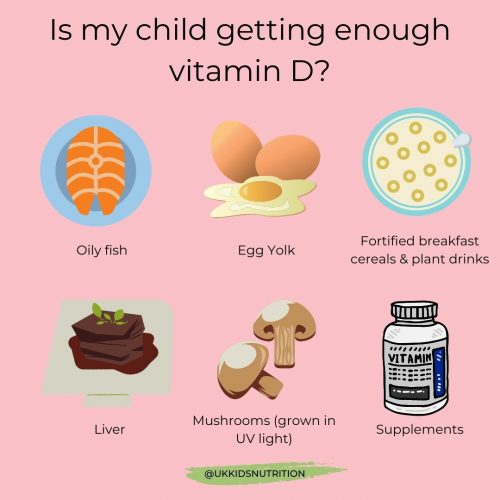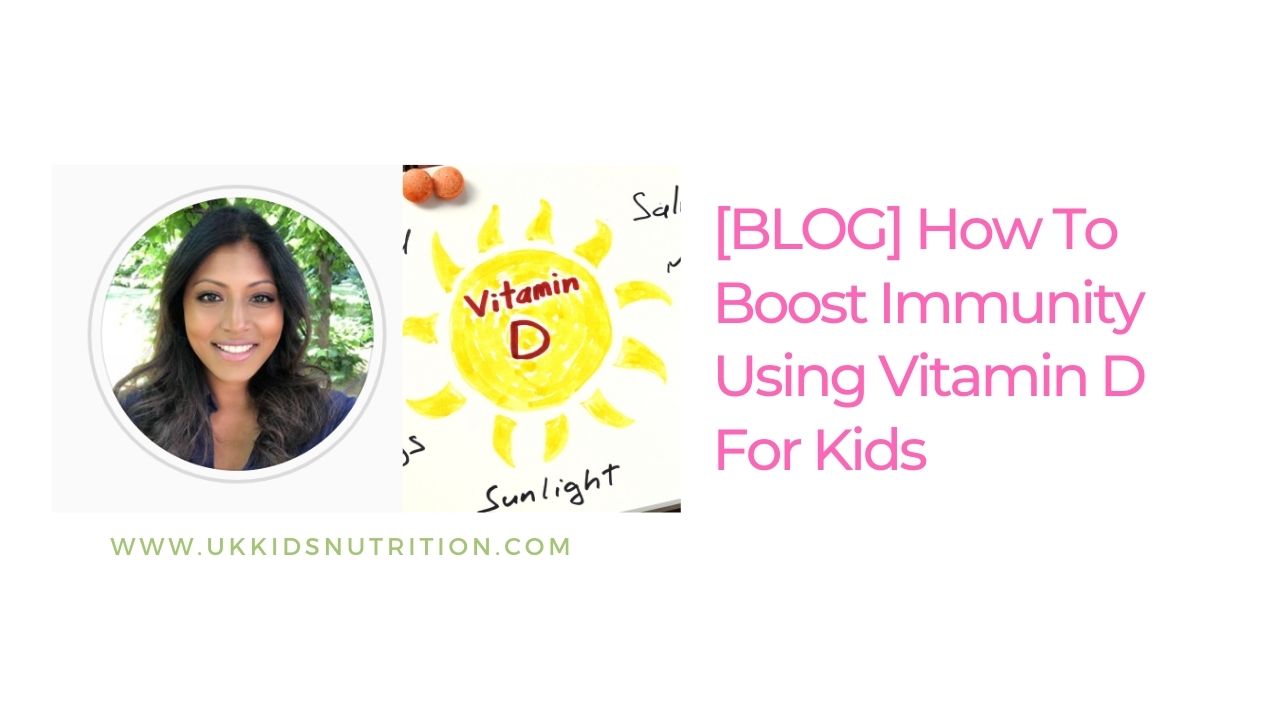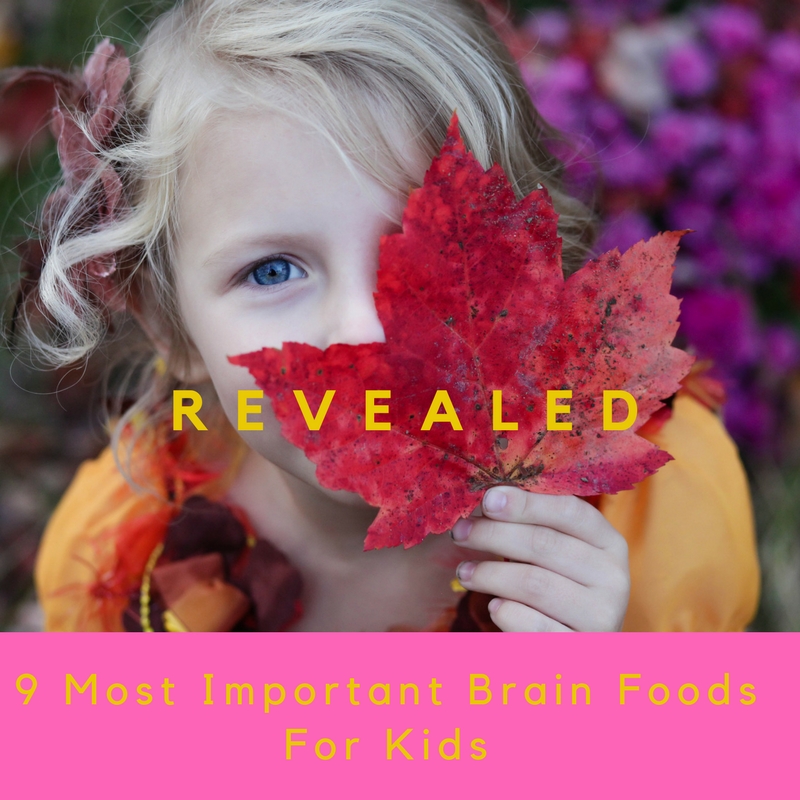Worried about your child’s immunity? Perhaps your child is also a fussy eater and suffers from frequent coughs and colds. With the current coronavirus pandemic, you’ve heard that vitamin D can boost immunity and you want to know the scoop on how much vitamin D to give. The truth is, although vitamin D does have an important role in immunity, the official advice on vitamin D for kids is very much the same. Surprised? I thought so, keep reading to find out more.
Please note that I have included affiliate links to products that I normally recommend to my clients. If you purchase via these links, there is no additional charge to you.
What is Vitamin D?
Your child can get most of their daily requirements of vitamins and minerals through their diet, except for this sunshine vitamin. Vitamin D is actually a hormone but is also referred to as a fat-soluble vitamin.
There are two types of vitamin D:
- vitamin D3, animal source also known as cholecalciferol
- vitamin D2, obtained from plant sterol, also known as ergocalciferol
Did you know that apart from oily fish, most foods contain very little vitamin D? This is why it’s important that babies and toddlers take a vitamin D supplement to meet their daily requirements.
Babies and young children may also be covered up in sunscreen to protect their skin from the sun, which affects how much vitamin D their bodies make. More on the metabolism of vitamin D is further in the article.
Sources of Vitamin D3
- Oily fish and fish oil
- Cod liver oil
- Egg yolk
- Dietary supplements
Sources of Vitamin D2
- Mushrooms (grown in UV light)
- Fortified foods
- Dietary supplements

How does the body make ‘active’ vitamin D?
Vitamin D3 is made in the skin from a compound called provitamin D3 (7-dehydrocholesterol) when exposed to sunlight. Provitamin D3 becomes biologically active after hydroxylation in the liver to 25 hydroxyvitamin D (25OHD) or calcidiol, then turned into the ‘active’ hormonal form called 1,25 dihydroxycholecalciferol (1,25(OH)2D3) or calcitriol in the kidneys.
The kidneys then release the activated vitamin D back into the bloodstream where it regulates how your child’s body uses calcium and phosphorus.
Is vegan vitamin D as effective as the animal type of vitamin D?
The plant-based form, Vitamin D2 can also be converted into calcitriol by the body to perform the same health benefits.
However, scientists think that the vegan form of vitamin D2 is not as efficacious at raising serum 25(OH)D concentrations as vitamin D3. This is down to the way how plant-based vitamin D is metabolised and activated by the kidneys.
As vitamin D has an important role in immunity and not just in supporting children’s growth and development of healthy bones and teeth, this has been a topic of hot debate.
Nevertheless, more research is required to confirm these research findings. At present, if your child is following a plant-based diet, you can continue to use vitamin D2 supplements to meet their daily requirements of vitamin D.

How does vitamin D help immunity?
Scientists have discovered that vitamin D receptors (VDR) known as the vitamin D activating enzyme ‘1-α-hydroxylase’ (CYP27B1) are present in the majority of immune cells. This includes B and T lymphocytes, monocytes, macrophages and dendritic cells. The latter are the sentinels of the immune defence system.
Immune cells are also one of the few cells apart from the kidney that can locally convert 25(OH)D₃ into its active form 1,25(OH)₂D₃. Unlike the kidney, there’s no feedback mechanism so immune cells can continue to make high quantities of calcitriol as required for the modulation of the immune system.
What this means is that in monocytes and macrophages, vitamin D is used to promote an antibacterial response to infection. In dendritic cells, vitamin D has a role in helping children modulate the function of their T-cells which helps prevent the development of the disease of common pathogens.
The most common infections among children are ear infections, the common cold, urinary tract infections, pharyngitis, and upper and lower tract respiratory infections.
Having said that, unlike other vitamins like vitamin C, where you could give children a slightly higher dose during illness to reduce the duration of the infection, the advice for the amount of vitamin D for kids remains the same. The Department of Health in the UK advises against buying more vitamin D for kids than what they actually need.
How much vitamin D do babies need?
Babies up to the age of 1 year need 8.5 to 10 micrograms of vitamin D a day (µg/day). This can be given as a supplement. For babies drinking at least 500ml of formula a day, an additional supplement is not required. Breastfed babies can start a vitamin D supplement from birth.
How much vitamin D for toddlers
Children aged 1 to 4 years need 10 µg/day (400 IU) of vitamin D daily.
How much vitamin D do older children need?
Children need at least 30 mins of exposure to the sun 2-3 times a week. During the summer months, most children will get enough vitamin D through sunlight and won’t need an additional supplement.
However, today due to new lifestyles and the restrictions of the current pandemic, children are having less exposure to the sun. They may also need 10 µg a day all year round.
Children from African, African-Caribbean or south Asian backgrounds may also need a vitamin D supplement all year through as their darker skin can reduce how well vitamin D is made in the skin.
If your child spends most of their day indoors or if they wear clothing that covers most of their skin when outdoors, they will require a daily vitamin D supplement providing 10µg per dose.
| Daily Vitamin D Requirements (age) | Amount (ug/day) |
|---|---|
| 0-12 months | 8.5-10 |
| 1 – 4 years | 10 |
| 4-18 years | 10 (September to March) |
Signs of vitamin D deficiency in children
In children who are otherwise well, in the short term, if they have low levels of vitamin D, they may show few or no symptoms. When the low levels of vitamin D persist over a long period of time, this can lead to stunted growth or rickets.
Nutritional rickets is one sign and consequence of deficiency. In this condition, there is softening and weakening of bones in children due to prolonged vitamin D deficiency.
Sometimes, rickets develops in children with rare conditions of the kidney, and liver and in conditions where malabsorption of fat exists (e.g. coeliac disease, cystic fibrosis, inflammatory bowel disease, short bowel syndrome, food allergies). Your child’s medical team will prescribe special doses of vitamin D to help manage hypovitaminosis D.
Some studies have linked low levels of vitamin D with an increased risk of asthma attacks in children. Other studies have also found that children who received vitamin D supplements experienced fewer asthma attacks needing treatment with oral steroids.
The main drawback of research in this area is that baseline vitamin D status was only included in one study. Due to the overall differences in the study design such as the amount of vitamin D3 given, it’s not possible to draw conclusions and more research is required in this area.
Brands with vitamin D for kids
Nature and Nurture Baby and Child Vitamins (10 µg per 0.5ml)
Vitabiotics Vitamin D drops (10 µg per 0.5ml)
BetterYou DLux Vitamin D3 Spray (10 µg per spray)
Natures Aid Vitamin D3 drops (10 µg per 1ml)
NHS Healthy Start Vitamin drops (10 µg per 5 drops, plus vitamins A, C)
Chewable vitamin D supplement for kids
Boots Kids Daily Health Multivitamins and Minerals (10 µg per tablet)
Vitabiotics Peppa Pig Vitamin D (10 µg per soft jelly)
Bottomline
It’s tempting to give your child additional vitamin D supplements to boost immunity. Just remember that there are still a lot of unanswered questions in the role of immunity and vitamin D in kids. At present, as we move towards winter, it’s certainly worthwhile starting a vitamin D supplement providing no more than 10 µg per dose (unless your child’s doctor recommends otherwise).
Need help with a picky eater?
Join the Fussy Eating Programme which gives you access to course materials and personalised advice from a registered paediatric dietitian.
Let Me Help
Would you like to meet a children’s dietitian who has successfully helped families solve their nutrition problems from around the world?
No matter what you are worried about, I’ll help you manage these with confidence.



